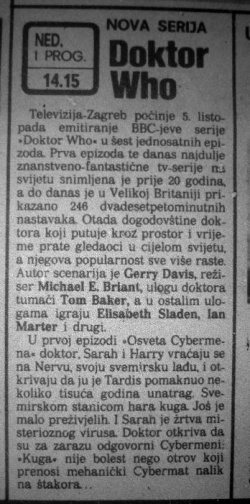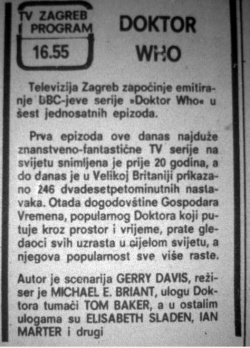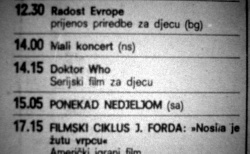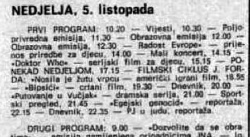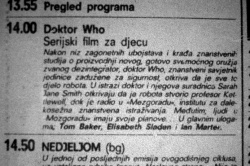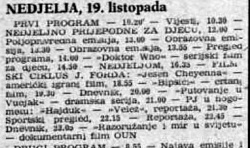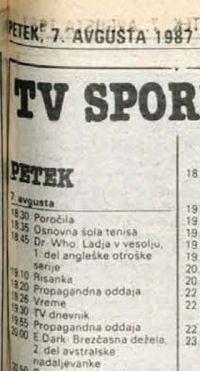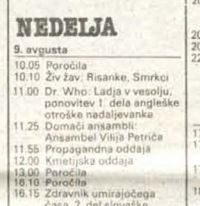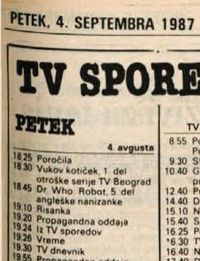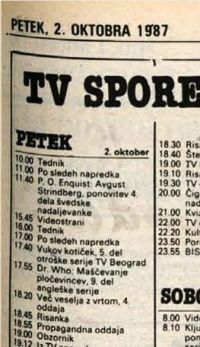Yugoslavia
The former Federal Republic of YUGOSLAVIA was in eastern Europe.
Following political and civil unrest in mid-1991, the states that made up Yugoslavia split from the Federation to form seven new independent nations: Bosnia and Herzegovina, Croatia, Kosovo, Macedonia, Montenegro, Serbia, and Slovenia.
This profile deals with Yugoslavia as it was in the 1980s.
Profile
| Country Number (61) | 1986 | THIRD WAVE |
| Region | Europe | |
| Television commenced | 1956 | |
| Colour System | 1971 | PAL |
| Population | 1987 | 22.875 million |
| TV Sets | 1987 | 4 million |
| Language/s | Serbo-Croatian, Slovene, Macedonian | subtitled |
Television Stations / Channels
Yugoslavia began its television service in 1956, adopting the PAL colour broadcast system in 1971.
There was just one television station: Jugoslovenska Radiotelevizija, a government-owned commercial broadcaster based in Belgrade, however each region operated its own channel with separate schedules; these broadcasts could be viewed by neighbouring states.
Foreign programmes usually retained their original soundtracks, with subtitles.
Northern Yugoslavian stations were also available in Hungary.
In the years following the dissolution of the federation in 1991, at least two of the new countries are known to have had the TV Movie -- Croatia and Slovenia; see those separate profiles for more details.
DOCTOR WHO IN YUGOSLAVIA (DOKTOR WHO)
Yugoslavia was about the 61st country to screen Doctor Who (see Selling Doctor Who). It was the seventh in Europe.
BBC Records
In a BBC memo dated 7 July 1965, Yugoslavia was one of several European countries to which the series had been offered. The stories auditioned were An Unearthly Child and The Daleks. However, the offer was not accepted and no sale eventuated.
The Eighties - THE LOST CHAPTERS records a sale of "(3)" stories to "Yugoslavia" (by 10 February 1987).
The country is not named in any of the DWM story Archives.
Stories bought and broadcast
TOM BAKER
Three stories, 12 episodes:
| Croatian title | Slovenian title | |||
| 4A | Robot | 4 | Robot | |
| 4C | The Ark in Space | 4 | Ladja v Vesolju | |
| 4D | Revenge of the Cybermen | 4 | Osveta Cybermena | Maščevanje Pločevincev |
Yugoslavia therefore bought three GROUP A Tom Baker stories.
The same three serials had also been sold to France and Greece the same year, presumably as part of a "Europe package".
The series would have been supplied as PAL colour video tapes with English soundtracks, which aired presumably with Serbo-Croatian, Slovene, and/or Macedonian subtitles. (Croatian and Slovenian newspapers provide the different story titles noted above.)
(Although the station was also available in Hungary, there would not have also been Hungarian / Magyar subtitles.)
Transmission
NOTE: The following details come from a Croatian newspaper, but these transmissions on TV ZAGREB would have been available in other regions of Yugoslavia.
The series commenced on Sunday (Nedjelja), 5 October 1986, screening from 2.15 to 3.05pm, two episodes back to back. (Glas Podravine gives the slightly longer timeslot of 2.15 to 3.15pm).
The first story was Revenge of the Cybermen ("Osveta Cybermena").
The second serial, 19 and 26 October (2.00 to 2.50pm / 2.14 to 3.05pm) was identified from the listings synopsis as Robot (see below).
The third and final serial, The Ark in Space, aired on 2 and 9 November (2.15 to 3.05pm; Glas Podravine also gives a longer 9 November timeslot of 2.15 to 3.15pm); this was not identified by title in the Croatian listings, but was in Slovenian papers.
It's not clear why the three serials would have aired out of order, particularly given the linked narrative between the first and third serials.
The 1996 TV Movie was later shown on TV in the newly-independent Croatia -- see the separate profile page for this.
NOTE: The following details come from a Slovenian newspaper, but these transmissions would have been available in other regions of Yugoslavia.
There were two screenings of each serial on Slovenian TV.
The three stories aired in a different but still incorrect order, with The Ark in Space ("Ladja v Vesolju") first, followed by Robot, then Revenge of the Cybermen ("Maščevanje Pločevincev").
The first run was weekly on Fridays, from 7 August 1987 to 23 October 1987. Each serial was shown episodically; the first few episodes from 6.45 to 7.10pm, but the 25 minute slot then shifted around after that, with the earliest at 5pm.
The same episode was then shown again two days later, each Sunday from 9 August 1987 to 25 October 1987, again with various different start times, between 9.10am and 11am.
The 1996 TV Movie was released on VHS in Slovenia -- see the separate profile page for this.
OTHER REGIONS?
It is highly likely that these three stories / twelve episodes were shown in other regions; we have not been able to access other regional newspapers to confirm.
From 1996, programmes on video-tape were supplied by the BFBS / SSVC service to British peace-keeping forces stationed in Bosnia following the recent civil war.
The Paul McGann TV Movie was likely shown in the late 90s / early 2000s, and/or released on VHS in the newly-independent states.
TV listings
| ← AIRDATES ...... (CLICK ICON TO GO TO TABLE SHOWING EPISODE BREAKDOWN AND AIRDATES - N/S = story title is Not Stated) |
The Croatian listings are from the Zagreb newspaper, Vjesnik and the online edition of Glas Podravine (available at GLAS PODRAVINE).
All listings were for "Doktor Who", which was described as a "serijski film za djecu", which is "film series for children".
In the full week's TV listings of Vjesnik the week before, the "Nova serije" ("New series") was previewed by a short introductory article which gave a brief background to the series, and confirms that only six episodes will screen:
- Televizija-Zagreb pocinje 5 listopada emitiranje BBC-jeve serije >>Doktor Who<< u sest jednosatnih epizoda. Prva epizoda te danas najdulje znanstveno-fantasticne tv-serije na svijetu snimljena je prije 20 godina, a do danas je u Velikoj Britaniji prikazano 246 dvadesetpetominutnih nastavaka. Otada dogodovstine doctor koji putuje kroz prostor i vrijeme, prate gledaoci u cijelom svijetu, a njegova popularnost sve vise raste.
- Autor scenarija je Gerry Davis, reziser Michael E Briant, ulogu doktora tumaci Tom Baker, a u ostalim ulogama igraju Elizabeth Sladen, Ian Marter I drugi.
- U prvoj epizodi >>Osveta Cybermena<< doktor, Sarah i Harry vracaju se na Nervu, svoju svemirsku ladu, i otkrivaju da ju je Tardis pomaknuo nekoliko tisuca godina unatrag. Svemirskom stanicom hara kuga. Jos je malo prezivjelih. I Sarah je zrtva misterioznog virusa. Doktor otkriva da su za zarazu odgovorni Cybermeni: Kuga nije bolest nego otrov koji prenosi mehanicki Cybermat nalik na stakora...
which translates as:
- Television-Zagreb begins October 5 to broadcast the BBC series >>Doctor Who<< in six one-hour episodes. The first episode of now the longest running science-fiction TV series in the world was recorded 20 years ago, and to date in the UK has shown 246 twenty-minute instalments. Since then, the adventures of the Doctor, who travels through space and time, has viewers following throughout the world, and its popularity is increasing.
- Written by Gerry Davis, director Michael E Briant, interpreting the role of the Doctor, Tom Baker, and other roles played Elizabeth Sladen, Ian Marter and others.
- In the first episode of >>Revenge of the Cybermen<<, the Doctor, Sarah and Harry return to the Nerva, the space base, and discover that the Tardis has shifted a few thousand years back, a space station plague, and even the few survivors. And Sarah is the victim of a mysterious virus. The Doctor discovers that the Cybermen are responsible for the infection: bubonic plague is not a disease but a poison that is transmitted by mechanical rat-like Cybermats ...
(It's not clear where the figure of 246 comes from; by 1986 the episode count was nearing 646; 246 is probably a misprint of that.)
The 5 October 1986 issue repeats the introduction, which is slightly different, and drops the synopsis:
- Televizija Zagreb zapocinje emitiranje BBC-jeve serije Doktor Who u sest jednosatnih epizoda.
- Prva epizoda ove danas najduze znanstveno-fantasticne TV serije na svijetu snimljena je prije 20 godina, a do danas je u Velikoj Britaniji prikazano 246 dvadesetpeto minutnih nastavaka. Otada dogodovstine Gospodara Vremena, popularnog Doktora koji putuje kroz prostor i vrijeme, prate gledaoci svih uzrasta u cijelom svijetu, a njegova popularnost sve vise raste.
which translates as:
- Zagreb television begins broadcasting the BBC series Doctor Who in six one-hour episodes.
- The first episode of the longest running sci-fi TV series in the world was recorded 20 years ago, and to date in the UK there have been 246 twenty-minute episodes. Since then, the adventures of the Time Lord, the popular Doctor, who travels through space and time, are followed by viewers of all ages around the world, and its popularity is increasing.
(This preview gives the incorrect start time of 16.55; it was 14.15pm.)
For the 19 October 1986 listing, there was a full synopsis for the episode, which reads:
- Nakon niz zagonetnih ubojstava i krada znanstvenih studija o proizvodnji novog, gotovo svemocnog oruzja zvanog dezintegrator, doktor Who, znanstveni savjetnik jedinice zaduzene za sigurnost, otkriva da je sve to djelo robota. U istrazi doktor i njegova suradnica Sarah Jane Smith otkrivaju da je robota stvorio profesor Kettlewell, dok je radio u Mezgoradu institutu za dalekosezna znanstvena istrazivanja. Medutim, ljudi u Mozgoradu imaju svoje planove. U glavnim ulogama; Tom Baker, Elizabeth Sladen i Ian Marter.
which translates as:
- After a series of mysterious murders and the theft of scientific studies on the production of a new, nearly all-powerful weapon called the disintegrator, Doctor Who, the scientific adviser to the unit in charge of security, discovers that it is all the work of robots. During the investigation of the doctor and his assistant Sarah Jane Smith, it is revealed that the robot was created by Professor Kettlewell, while working at the Mezgoradu Institute for widespread scientific research. However, the people in Mozgoradu have their own plans. The cast, Tom Baker, Elizabeth Sladen and Ian Marter.
(Mezgoradu / Mozgoradu is probably the Croatian equivalent of Thinktank.)
The 1987 listings are from the Slovenian paper Gorenjski Glas - Online HERE.
This paper lists the series as "Dr Who", and also gives story titles, followed by a sequence number - e.g. Robot part 1 is billed as episode "5", as it was the fifth episode (of the 12) to screen. Likewise, Revenge of the Cybermen part 1 was billed as episode "9".
Websites
The new series of Doctor Who was mentioned in this (now closed) Croatian website (Do Croats ‘get’ the series?) which also has a general reference to the "old series":
- "The problem with the reception of Doctor Who in Croatia lies in the fact that it has been ‘marketed’ (and scheduled) as a show for kids, which – despite some episodes – it is not. On top of that, the gap between the airings of the original series (way back when) and the new is so large, the ‘new’ Doctor Who was completely lost on the generations that might have watched or have watched the ‘old’ series."
Yugoslavia in Doctor Who
- In Serbo-Croat, the word "dalek" means "alien" or "remote" (see the synopsis above for Robot, which contains the word "dalekosezna").
- Chameleon Tours fly to Dubrovnik (The Faceless Ones).
- The city Belgrade is mentioned in Frontier in Space.
- The Doctor's companion Tegan Jovanka was named after Yugoslav President Tito's wife, Jovanka.
- It was because of the 1984 Winter Olympics in Yugoslavia that the BBC was forced to re-edit Resurrection of the Daleks and screen it as two-45 minute episodes.
- The abandoned Coast to Coast Doctor Who movie was to have some of its location filming in Yugoslavia.
- Goran Višnjić (who appeared as Nikola Tesla in the 2020 season of the New Series) was born in Šibenik, Croatia in 1972.


